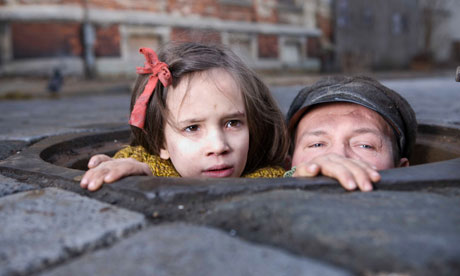
Here is the dramatised true story of Leopold Socha: the sewer worker in Lvov in occupied Poland during the second world war who hides terrified Jews in secret underground passageways, while the vicious Nazis strut above ground. At first, Socha greedily takes all the money the desperate Jews offer him, but gradually, through the mysterious workings of redemption and grace, becomes their genuinely concerned protector. (After the war, Socha was posthumously awarded Israel's Righteous Among the Nations title.) In Darkness has something different from the storytelling brashness of Spielberg's Schindler's List – although there are similarities, including a reformed rogue and a chilling Nazi. In its fear, shame and horror, it's possibly closer to The Third Man. The brickwork tunnels, with their flickering ripples of filthy water, all look familiar. Here, the sewers are an earthly hell, a purgatorial afterlife running in parallel with the life being lived, making everyone's deepest fears a reality. But the horrors of hell are visited on the just, while the unjust walk around in airy freedom. Robert Wieckiewicz is perfectly cast as Socha, the chancer and survivor who becomes a hero. There is release at the end of this fine film, but no euphoria; just a sense of having come through a period of evil, the memory of whose darkness will never entirely lift.

